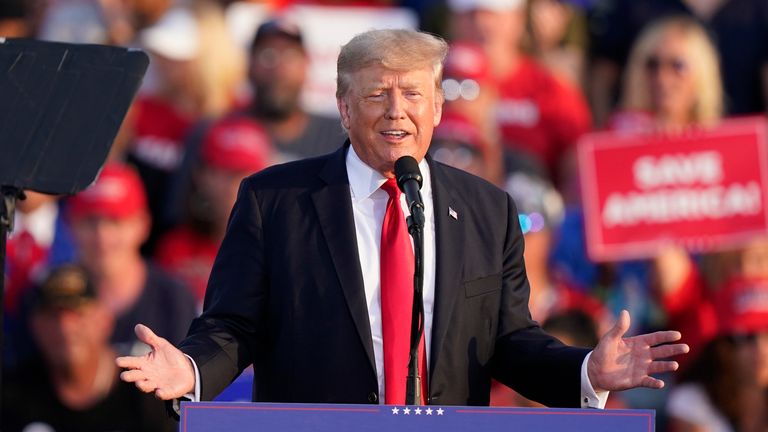Donald Trump, who lost the 2020 presidential election, says he is launching a class action lawsuit against Mark Zuckerberg, Sundar Pichai, and Jack Dorsey, the chief executives of Facebook, Google and Twitter respectively, as well as their companies.
The former president was banned from these companies’ platforms after a mob of his supporters violently attacked the US Capitol building on 6 January, hundreds of whom have since been charged with crimes.
Since leaving office Donald Trump has criticised the bans as an act of political censorship, and has continued to claim without evidence and despite official contradictions that the election was rigged against him.
6 January: Officer crushed in door as mob storm CapitolThe class action suit would allow Mr Trump to sue the chief executives of Facebook, Youtube and Twitter on behalf of a wider group of people whom he argued have been injured by the alleged bias and censorship.
“Today, in conjunction with the America First Policy Institute, I am filing, as the lead class representative, a major class-action lawsuit against the big tech giants, including Facebook, Google and Twitter, as well as their CEOs, Mark Zuckerberg, Sundar Pichai, and Jack Dorsey,” he said.
AdvertisementThe companies declined to comment when contacted by Sky News.
While in office, Mr Trump had attempted to reform social media regulation – in particular a law which allows platforms to perform “good faith” content moderation without assuming the liability of a publisher.
More on Donald Trump Donald Trump among worst US presidents of all-time, survey of historians finds Trump Organization executive Allen Weisselberg surrenders to authorities ahead of expected charges Donald Trump’s family business indicted on criminal charges Rudy Giuliani’s law licence suspended in New York after ‘uncontroverted evidence’ he made false statements UFO report: Are we alone? What will Donald Trump do next?Several instances of this “good faith” moderation targeting the then president – in particular Twitter fact-checking two of his tweets which falsely claimed postal votes were fraudulent, and hiding another which the company said glorified violence – provoked the reform.
The former president, who had persistently accused both traditional and social media of being biased against him, complained that social media platforms “totally silence conservative voices”.
He promised to “close them down before we can ever allow this to happen”, and subsequently signed an executive order calling on federal agencies to review Section 230.
A recent survey of Americans by C-Span found him to be considered among the worst US leaders of all time, scoring particularly low among a panel of experts for his moral authority and administrative skills.
